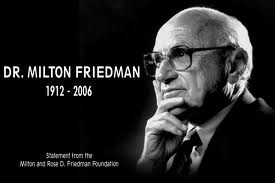Euro : Was Milton Friedman right ?

Crisis and austerity fatigue has been spreading across the entire European economy in recent months. Nobody any more understands the justification for the increased fiscal tightening overwhelming those countries struggling to grow. There is concern everywhere that the combination of a strong currency and fiscal austerity carries the risk of greater inequality and job devastation. In some countries of
A basic teaching of economic science is that crises are aggravated by austerity and monetary contraction. That was the overarching lesson of the 1930s, which could have been avoided by accommodative economic policies instead of austerity. Yet the Euro zone is taking the same route because of a lack of vision and political obstinacy.
In an astonishing ideological about-turn, the IMF now advocates spreading fiscal pain over several years. If the IMF, which had advocated across-the-board austerity, is changing tack, then things must be bad. An economic trap is closing relentlessly on
It would obviously have been better to encourage an inflationary surge than to combat inflation. The indiscriminate battle against an illusory inflation will lead to deflation. Previous examples are rare (Europe in the last quarter of the 19th century, the United States between 1929 and 1933, Japan in the 90s). Inflation can be combated with higher interest rates and with price and wage controls. The cost is economic slowdown. Deflation on the other hand is catastrophic as it renders conventional monetary policy ineffective. Deflation leads to unproductive savings, high real interest rates and a faltering economy. The only escape route we know is to inject liquidity. This is why the champions of austerity have been so wrong: by trying to avoid inflation, they have pushed the economy into deflation… which will ultimately require inflation.
However, there is another problem. The euro crisis has exposed growing divergences between the countries that adopted the single currency. The euro was supposed to promote harmony between different nations. The opposite has happened. The euro now crystallises social grievances, cruelly illustrated by the Spanish March for Dignity. The deterioration in Franco-German relations is in this connection edifying. These two nations are the cement binding monetary union together. But we see deep-seated disagreements between them resurfacing with a vengeance. The currency uniting them has now become a profound political irritation.
Previously, countries which lagged behind could devalue their currency and boost exports at the cost of imported inflation. Devaluation was a way of adjusting the currency for the weakness of the economy. The devaluation weapon is no longer available today. Only an internal devaluation is possible, i.e. curtailing domestic consumption to boost external competitiveness. Short term, this policy leads to increased unemployment and inequality, potentially triggering social disruption.
A number of investment banks have calculated how much the different Euro zone countries would devalue or revalue if they reverted to their former currencies (Deutschemark, French franc, peseta, etc.). The figures are astounding: the Deutschmark would be revalued by 25% and the French franc devalued by 20%. The difference in value between the currencies of the Euro zone’s two founding members would be 45%. How does this differential, which the euro conceals, manifest itself at the moment? It can be seen in divergent deindustrialisation and unemployment rates. Longer term, it will appear when the weaker countries' debt is restructured. That is why government bond yields are doubtless too high in
Without wishing to be a doom monger, I believe the future of the single currency is jeopardised by the crisis and by the lack of consensus between governments over an economic plan. A return to monetary policy basics is also needed, i.e. a politically driven monetary policy. An emblematic currency cannot make the "real" economy function in an orderly way without political backing and popular support.
To save the euro, money supply must be increased. I remain convinced that inflation will reduce the value of public debt in relative terms. This is not apparent yet, as money creation is feeding into the real economy with difficulty given sluggish bank funding channels. But there is no longer any doubt that the time will come when money creation ends up diluting public debt.
To conclude, two risks seem underestimated in my view. The first is monetary. The single currency was introduced without first preparing the euro zone to be an efficient currency area characterised by fiscal and budgetary harmonisation and labour force mobility. The second risk is political. The euro is no longer a socially unifying project. It is even the cause of profound social resentment in the southern periphery. In the past, social risk was mitigated by devaluation. These tools are no longer available to us today. The rigid nature of the currency forces us to accept that other parameters are now adjustable. So it is theoretically possible for the euro to become a destabilising force.
The risk of this happening leads me to think that, while the euro is legal tender, it is no longer social in nature. A single currency, it is no longer experienced in common. The euro has become a fundamentally deflationary currency and we are perhaps falling into a Japanese-style trap of a strong currency with insufficient inflation and growth. The Nobel economics prize winner Milton Friedman predicted in 1997 that the creation of a single currency would make the absence of political unity worse. Sadly, he may have been right.
